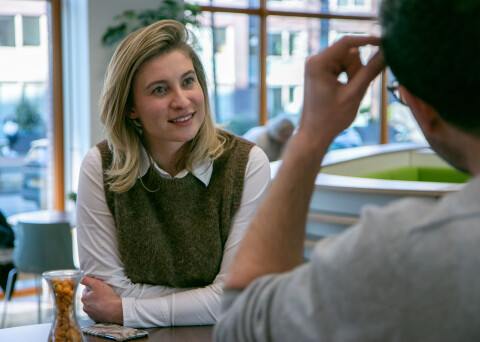
January 3rd 2025
Keep seeing the human being
- reconciliation
- humanity
- polarization
- opinions
During a networking event, Noor Broeders, a former colleague at Refugee Talent Hub, met Michael, a young newcomer from Ethiopia with an impressive story. His message of humanity and reconciliation is touching and inspiring, especially in times of polarization. Read Noor's opinion piece in Het Parool below.
During a networking event in Sloterdijk with newcomers who are eager to get started, I met Michael. Michael is from Ethiopia, is my age (28) and came here on his own after almost everyone in his immediate environment was killed during the ethnic civil war in Tigray. His journey lasted a year and a half, and he never expected to end up in the Netherlands.
On one of his first nights in Ter Apel, Michael heard someone speaking in the accent of 'the enemy' in his shared bedroom. He was furious, sad, scared, but remained rational: escalating would throw away his chances. What started with avoiding and ignoring, gradually shifted to hearing, looking, listening and at a later stage even talking, telling, laughing. With a human being.
When Michael told me this, I thought of the book Over de kloof by Maurits Chabot, which is about unreal friendships between people who at first glance seem condemned to enmity. The book and Michael's story make me realize that recognition, acceptance and reconciliation start with one fundamental principle: continuing to see the person behind the actions and the past. This makes me think. So it is possible.
The wars that are currently raging are increasing the polarization in our society. The most recent discussions and outbursts, on the streets and online, painfully expose this. And yes, it is understandable that emotions run high. It is logical that reasoning about injustice and misunderstanding sometimes translates into outbursts, insults and rages. It is almost impossible to explain rationally what people are doing to each other at the moment and it is logical that we sometimes no longer know where to look because of all the inhuman violence.
But what does it take to let both truths exist in our minds, to keep seeing that there is something to be said for both sides and that, on both sides, they are still people? Yes, that is harder work, mentally, and it does not happen automatically. It requires, as Marius Hora Adema so beautifully described, courage to face our own emotions and make room for those of another. But, if Michael can do it, then surely we can too?
I sent him the book in the asylum seekers' center where he is staying now. He loved it and has finished it by now. Reading it took a bit longer than he had hoped, he said, because of his driving test and Dutch studies. So, integration is going quite well.